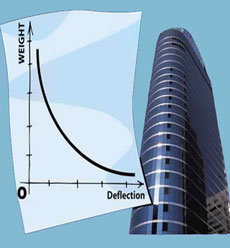Structural Engineering
 Structural engineering is a field of civil engineering that deals with the analysis and design of structures that would safely bear or resist the loads, stresses and other forces. Structural engineers must ensure their designs satisfy given design criteria (as per the guideline or code specified), predicated on safety (e.g. structures must not collapse without due warning) or serviceability and performance (e.g. building must not sway causing discomfort to the occupants). Buildings are made to endure massive loads as well as changing climate and natural disasters.
Structural engineering is a field of civil engineering that deals with the analysis and design of structures that would safely bear or resist the loads, stresses and other forces. Structural engineers must ensure their designs satisfy given design criteria (as per the guideline or code specified), predicated on safety (e.g. structures must not collapse without due warning) or serviceability and performance (e.g. building must not sway causing discomfort to the occupants). Buildings are made to endure massive loads as well as changing climate and natural disasters.
Structural Engineers have a duty to their clients and the public to provide safe designs. Typically, the Structural Engineer is responsible for the structural design of the overall project, including specification of the design loads, issuance of design documents, and review of submittals. Structural engineers are responsible for making creative and efficient use of funds, structural elements and materials to achieve these goals.
Structural engineers are licensed or accredited by different learned societies and regulatory bodies around the world (for example, the Institution of Structural Engineers in the UK). Depending on the degree course they have studied and/or the jurisdiction they are seeking licensure in, they may be accredited (or licensed) as just structural engineers, or as civil engineers, or as both civil and structural engineers.
Responsibilties
One of the major responsibilities of a Structural Engineer is to design a structure that is friendly to the weather and climatic conditions and to the human beings. His responsibility is to deal with the problems related to the bend, twist, and collapse of buildings and houses. Role and responsibilties of structural engineers may be summarized in following point:
- The structural Engineer is responsible for designing the structure of buildings and houses in a way such that, it can meet all the requirements of the client within the needed time span.
- He is also responsible for checking and examining of whether the structures and buildings are structurally well or not.
- He must calculate and estimate the pressure, weather and stress that the component of a house or building may face from different disasters such as earth quakes flood etc.
- He is responsible for analyzing the basic structures and several components of buildings and houses.
- He must be responsible enough to check out the quality of the numerous materials such as brick, steel, timber etc. that are used for the construction of buildings.
- His responsibility is to use computer and advanced technologies for constructing the best structure.
Education Requirement
A structural engineer will typically have a four or five year undergraduate degree, followed by a minimum of three years of professional practice before being considered fully qualified. The complexity of modern structures often requires a great deal of creativity from the engineer in order to ensure that structures support and resist the loads, they are subjected to. Structural engineering is a lot more technical in nature than civil engineering in general, or than most other engineering fields. Hence, the basic has to be strong. The structural engineers are most often subjected with the structural elements like Columns, Beams, Slabs, Trusses, Plates, Arches, Shells, Catenaries and their behaviours under different loading and stress conditions. Hence, they must be familiar with these terms. Beside these, they must have sound knowledge of properties of different kind of building or construction materials. Some of the common building materials are:
- Iron: Wrought iron, cast iron, steel and stainless steel.
- Concrete: Reinforced Concrete and Prestressed concrete
- Aluminium
- Masonry
- Alloy
- Composite Materials
- Timber
- Other structural materials: Carbon fibre, Fibre reinforced plastic, Roofing materials, Mudbrick, etc.
Salary & Job Profile
In USA, the average entry level salary (0-2 yrs experience) for Structural engineer is $53,100. The employee may require the necessary bachelor's degree in area of specialty. Main job is to design load-bearing structures or structural elements, such as buildings, bridges, or roadways perform analysis of building materials for use in construction develop blueprints or specifications for use during construction and ensure all projects comply with applicable codes and regulations. They also determines cause of structural failures, damages, and defects through site investigations and provides reports detailing investigations and assessment of damages to the structure. With 2-4yrs of experience in this field, the expected average salary is $68,300. He/She may relies on limited experience and judgment to plan and accomplish goals and work under general supervision. A certain degree of creativity and latitude is required. The employee has to be familiar with a variety of the field's concepts, practices, and procedures. For experience of 4-6yrs, the average salary is $88,100. The employee may have to lead and direct the work of others. A wide degree of creativity and latitude is expected. For eperience of 6-8yrs, the average salary is $104,300.
Summary:
| Experience | Average Salary (per annum) |
|---|---|
| 0 to 2 years | $53,100 |
| 2 to 4 years | $68,300 |
| 4 to 6 years | $88,100 |
| 6 to 8 years | $104,300 |




